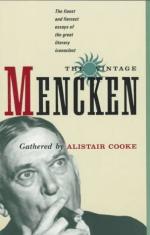
|
| Name: _________________________ | Period: ___________________ |
This test consists of 15 multiple choice questions and 5 short answer questions.
Multiple Choice Questions
1. What famous speech did Ralph Waldo Emerson deliver in 1837?
(a) The Pride of European Intellectualism.
(b) The Awfulness of War.
(c) The Merits of Monogamy.
(d) The American Scholar.
2. What does Mencken call a man who resists the charms of women?
(a) A most distinguished gentleman.
(b) A most rare beast indeed.
(c) An exceedingly wise stone statue.
(d) A most disgusting cad.
3. Which is one of the stated reasons the editor put the volume together?
(a) To expose the corrupt policies of Franklin Delano Roosevelt.
(b) To introduce the works of H. L. Mencken to a new generation.
(c) To fight charges that Mencken was racist.
(d) To sell books for profit.
4. According to Mencken, how did members of the lower class respond to Wilson?
(a) They "clapped like fools" at a recent speech.
(b) They threw rotten vegetables at him at the convention.
(c) They responded to his lower class domestic policies.
(d) They were attracted to his lofty rhetoric.
5. What did Mencken think about monogamy, as revealed in "Cavia Cobaya"?
(a) Monogamy stifled the natural urgings of a man.
(b) Great men aspired to and achieved it.
(c) Monogamy was the laughable product of democracy.
(d) Functionally, monogamy was the same as polygamy, because everyone cheats.
6. Who was the president of Cuba when Mencken visited the country in "Gore in the Caribees"?
(a) Teodorio.
(b) Leonhard.
(c) Jose Miguel.
(d) Menocal.
7. What was Mencken's criticism for Lincoln's Gettysburg Address?
(a) It was more about logistics and policy than stirring rhetoric.
(b) It was a slap in the face to Southern Democrats.
(c) It was more poetry than logic.
(d) It was full of racist remarks and innuendo.
8. Which was NOT a source of terrible smell in the Baltimore of the 1880s, according to Mencken?
(a) The Back Basin.
(b) Wilkins Hair Factory.
(c) The St. Helen's insane asylum.
(d) The glue factory.
9. How was Theodore Dreiser like Joseph Conrad, according to Mencken?
(a) Both men shared an innate pessimism.
(b) They both had a love of pirate adventures and the sea life.
(c) They both seemed to hate women.
(d) Both men were inherently optimistic.
10. What part of Mencken's work is NOT included in the volume?
(a) Mencken's nostalgic musings on Baltimore.
(b) Mencken's work on language and grammar.
(c) Mencken's political discourse of the 1920s.
(d) Mencken's esoteric views on art and art history.
11. What was the nature of the Prince of Wales story Mencken tells in "The Art Eternal"?
(a) The Prince of Wales begged for alms, in order to display his humility.
(b) The Prince of Wales framed a murderer he could not imprison by lawful means.
(c) The Prince of Wales stole in order to feed his citizens.
(d) The Prince of Wales lied in order to protect the virtues of a woman.
12. What did Mencken wonder about Henry Cabot Lodge?
(a) Why he thought he was so superior to everyone.
(b) Why he felt he must belittle everyone around him.
(c) Why he did not pick a more noble profession.
(d) Why he did not run for president.
13. Why shouldn't men trust other men?
(a) Men lie constantly.
(b) Men are only interested in accumulating wealth.
(c) Men can be subject to temptation, and thus betrayal.
(d) Men can become violent at any moment.
14. What organization did Mencken's father force him to join at age fourteen?
(a) The Junior Achievement League.
(b) The Baptist Church.
(c) The Boy Scouts of America.
(d) Y.M.C.A.
15. Why did Mencken disagree with contemporary assessments of Abraham Lincoln?
(a) Mencken believed a much broader conspiracy was in place in regards to Lincoln's assassination.
(b) Critics maligned Lincoln for his handling of the Civil War, and Mencken thinks he did a fine job.
(c) Abraham Lincoln did not get nearly enough credit for freeing the slaves, according to Mencken.
(d) Critics praised him as a hero and don't question some dubious sections of his biography.
Short Answer Questions
1. According to the editor, why were the 1930s Mencken's "downfall"?
2. What did Mencken satirize in "Quid Est Veritas"?
3. What was "The Art Eternal" according to Mencken?
4. Which man did Mencken dub the "Star-Spangled Man"?
5. Who is the editor of this volume?
|
This section contains 711 words (approx. 3 pages at 300 words per page) |

|




